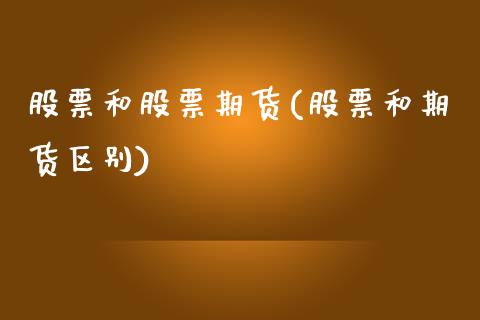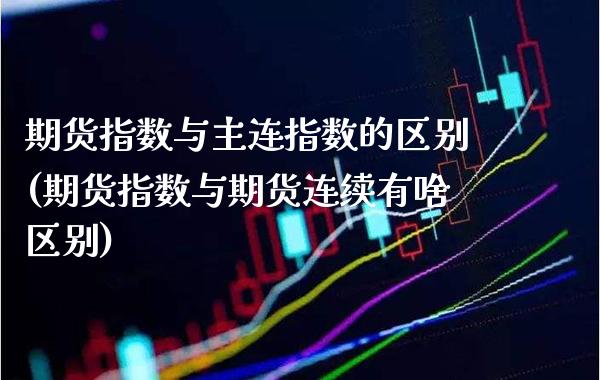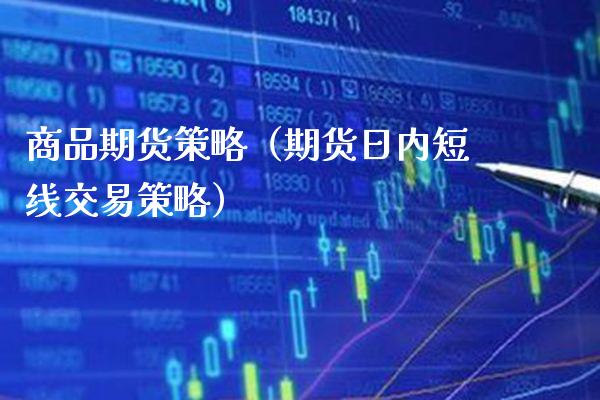股票和股票期货(股票和期货区别)
股票和股票期货是投资市场中常见的两种金融工具,它们都是投资者进行股票交易的方式,但在操作和风险方面有一些不同。股票是公司股份的一部分,投资者可以购买股票来成为公司的股东,从而分享公司的盈利和增长。而股票期货是一种金融衍生品,是一种合约,允许投资者以未来某个时间点购买或出售股票。在中,将对股票和股票期货进行详细比较,帮助投资者更好地了解这两种投资工具。

股票
股票是公司的股份,是公司的所有权证明。投资者购买股票时,实际上是在购买公司的一部分所有权,成为公司的股东。股票的价格受市场供需关系的影响,会随着公司的盈利情况、市场环境等因素而波动。投资股票的风险相对较高,但也有较高的回报潜力。投资者可以通过股票分红和股价上涨来获得收益。
股票期货
股票期货是一种金融衍生品,是一种合约,允许投资者以未来某个时间点购买或出售股票。股票期货的价格是由市场供需关系和未来预期价格共同决定的,投资者可以通过买入或卖出期货合约来进行投机或套保。股票期货的风险相对较高,但也有较高的杠杆效应,可以放大投资者的盈利和亏损。
股票和股票期货的区别
1. 投资方式不同:股票是直接购买公司股份成为股东,而股票期货是通过期货合约进行投机或套保。
2. 风险程度不同:股票的风险相对较高,受公司盈利情况等因素影响,而股票期货的风险更大,受市场波动和杠杆效应影响。
3. 盈利方式不同:股票投资者可以通过股价上涨和分红获得收益,而股票期货投资者主要通过买卖合约的价差来获取盈利。
如何选择股票或股票期货
1. 投资目标:如果投资者希望长期投资并分享公司的盈利,可以选择购买股票;如果希望进行短期投机或套保,可以选择股票期货。
2. 风险承受能力:股票期货的风险更大,需要投资者有较强的心理承受能力和风险管理能力;而股票的风险相对较小,适合风险偏好较低的投资者。
3. 投资经验:股票期货的交易方式更为复杂,需要投资者具备一定的投资经验和技术分析能力;而股票投资相对简单,适合新手投资者。
通过以上比较和选择指南,投资者可以更好地了解股票和股票期货这两种投资工具的特点和区别,根据自身的投资目标、风险承受能力和投资经验来选择适合自己的投资方式,实现财务增值和风险管理的平衡。Investing in stocks and stock futures (difference between stocks and futures)
Stocks and stock futures are two common financial instruments in the investment market. They are both ways for investors to trade stocks, but there are some differences in operation and risk. Stocks are shares of a company, and investors can buy stocks to become shareholders of the company, thereby sharing the company's profits and growth. Stock futures, on the other hand, are financial derivatives that allow investors to buy or sell stocks at a future point in time. In this article, we will compare stocks and stock futures in detail to help investors better understand these two investment tools.
Stocks
Stocks are shares of a company, which represent ownership in the company. When investors buy stocks, they are actually buying a part of the company's ownership and becoming shareholders of the company. The price of stocks is influenced by market supply and demand, and fluctuates with factors such as the company's profitability and market conditions. Investing in stocks carries relatively high risks, but also has the potential for high returns. Investors can earn profits through stock dividends and price appreciation.
Stock Futures
Stock futures are financial derivatives that are contracts that allow investors to buy or sell stocks at a future point in time. The price of stock futures is determined by market supply and demand and future price expectations. Investors can speculate or hedge by buying or selling futures contracts. Stock futures carry relatively high risks, but also have a high leverage effect, which can amplify investors' profits and losses.
Differences between Stocks and Stock Futures
1. Different investment methods: Stocks involve directly purchasing company shares to become shareholders, while stock futures involve speculation or hedging through futures contracts.
2. Different levels of risk: Stocks carry relatively high risks, influenced by factors such as company profitability, while stock futures carry greater risks, affected by market fluctuations and leverage effects.
3. Different profit mechanisms: Stock investors can earn profits through price appreciation and dividends, while stock futures investors mainly profit from the price difference of buying and selling contracts.
How to Choose Between Stocks and Stock Futures
1. Investment goals: If investors want to make long-term investments and share in the company's profits, they can choose to buy stocks; if they want to engage in short-term speculation or hedging, they can choose stock futures.
2. Risk tolerance: Stock futures carry greater risks and require investors to have strong psychological resilience and risk management capabilities; stocks have relatively lower risks and are suitable for investors with lower risk preferences.
3. Investment experience: Stock futures trading is more complex and requires investors to have a certain level of investment experience and technical analysis skills; stock investment is relatively simple and suitable for novice investors.
Through the above comparisons and selection guidelines, investors can better understand the characteristics and differences between stocks and stock futures, and choose the investment method that suits their investment goals, risk tolerance, and investment experience to achieve a balance between financial value enhancement and risk management.




















